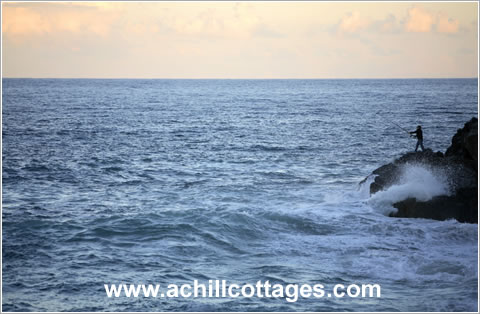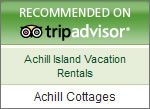Angling and Fishing on Achill Islands
Achill's Atlantic waters offer a huge variety of fishing opportunities, from shore- or beach fishing to deep sea angling on charter boats. No fewer than 34 species of fish have been caught in Achill waters, including cod, ling, conger, pollock, wrasse, mackerel, skate, dogfish, ray, blue shark, thresher, and porbeagle sharks. Rods, tackle, other equipment and bait are available in shops locally and Achill has several boats available for fishing charter.

Achill holds several Irish fishing records, including the Irish Record porbeagle which was caught off Achill in 1932 and the Record blue shark caught in 1959. According to the North Western Fisheries Board, specimen Fish caught off Achill between 2000 to 2005 were 8 tub gurnard, a red gurnard, a ballan wrasse and an electric ray. The Board has the following to say about shore angling in Achill:
Moyteoge Point and Keem Bay, near the western tip of the island, offer rock fishing for mackerel and pollack and beach fishing for coalfish, dogfish, flounder, turbot and ray. Moyteoge demands a long walk over heather and rock but the rewards make it worth the effort. The strand at Keem is easily reached by an exciting road. Basking shark can be seen there in early summer. Purteen Harbour is good for mullet, after ground-baiting and was the source of a Specimen conger in 1985. The magnificent strand at Keel, bordered to the north by deep water under the Meenaun Cliffs, yields dab, flounder, ray, sea trout and turbot. A 14 lb (6 kg) sea trout caught there in 1973 held the Irish Record for 10 years. Dugort, on the north side of the island, has an old pier and beach, yielding dab, flounder and ray in autumn. The pier at Darby's Point, close to the mainland at the southern tip of Achill, is good for spinning for mackerel and pollack, with flounder for bottom-fishing. Lugworm can be dug in a backwater to the west of the point.
Sea Angling
Species of fish caught in Achill waters include:
- Cod
- Ling
- Conger
- Pollock
- Wrasse
- Mackeral
- Skate
- Dogfish
- Ray
- Blue Shark
- Thresher
- Porbeagle Shark
- Tub Gunard
- Red Gunard
- Turbot
- Coalfish
- Dab
- Flounder
- Sea Trout














